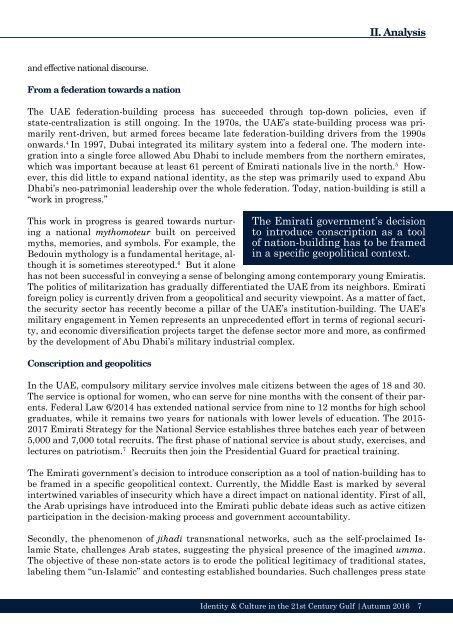Create successful ePaper yourself
Turn your PDF publications into a flip-book with our unique Google optimized e-Paper software.
II. Analysis<br />
and effective national discourse.<br />
From a federation towards a nation<br />
The UAE federation-building process has succeeded through top-down policies, even if<br />
state-centralization is still ongoing. In the 1970s, the UAE’s state-building process was primarily<br />
rent-driven, but armed forces became late federation-building drivers from the 1990s<br />
onwards. 4 In 1997, Dubai integrated its military system into a federal one. The modern integration<br />
into a single force allowed Abu Dhabi to include members from the northern emirates,<br />
which was important because at least 61 percent of Emirati nationals live in the north. 5 However,<br />
this did little to expand national identity, as the step was primarily used to expand Abu<br />
Dhabi’s neo-patrimonial leadership over the whole federation. Today, nation-building is still a<br />
“work in progress.”<br />
This work in progress is geared towards nurturing<br />
a national mythomoteur built on perceived<br />
myths, memories, and symbols. For example, the<br />
Bedouin mythology is a fundamental heritage, although<br />
it is sometimes stereotyped. 6 But it alone<br />
has not been successful in conveying a sense of belonging among contemporary young Emiratis.<br />
The politics of militarization has gradually differentiated the UAE from its neighbors. Emirati<br />
foreign policy is currently driven from a geopolitical and security viewpoint. As a matter of fact,<br />
the security sector has recently become a pillar of the UAE’s institution-building. The UAE’s<br />
military engagement in Yemen represents an unprecedented effort in terms of regional security,<br />
and economic diversification projects target the defense sector more and more, as confirmed<br />
by the development of Abu Dhabi’s military industrial complex.<br />
Conscription and geopolitics<br />
The Emirati government’s decision<br />
to introduce conscription as a tool<br />
of nation-building has to be framed<br />
in a specific geopolitical context.<br />
In the UAE, compulsory military service involves male citizens between the ages of 18 and 30.<br />
The service is optional for women, who can serve for nine months with the consent of their parents.<br />
Federal Law 6/2014 has extended national service from nine to 12 months for high school<br />
graduates, while it remains two years for nationals with lower levels of education. The 2015-<br />
2017 Emirati Strategy for the National Service establishes three batches each year of between<br />
5,000 and 7,000 total recruits. The first phase of national service is about study, exercises, and<br />
lectures on patriotism. 7 Recruits then join the Presidential Guard for practical training.<br />
The Emirati government’s decision to introduce conscription as a tool of nation-building has to<br />
be framed in a specific geopolitical context. Currently, the Middle East is marked by several<br />
intertwined variables of insecurity which have a direct impact on national identity. First of all,<br />
the Arab uprisings have introduced into the Emirati public debate ideas such as active citizen<br />
participation in the decision-making process and government accountability.<br />
Secondly, the phenomenon of jihadi transnational networks, such as the self-proclaimed Islamic<br />
State, challenges Arab states, suggesting the physical presence of the imagined umma.<br />
The objective of these non-state actors is to erode the political legitimacy of traditional states,<br />
labeling them “un-Islamic” and contesting established boundaries. Such challenges press state<br />
<strong>Identity</strong> & <strong>Culture</strong> in the 21st Century Gulf |Autumn 2016 7


